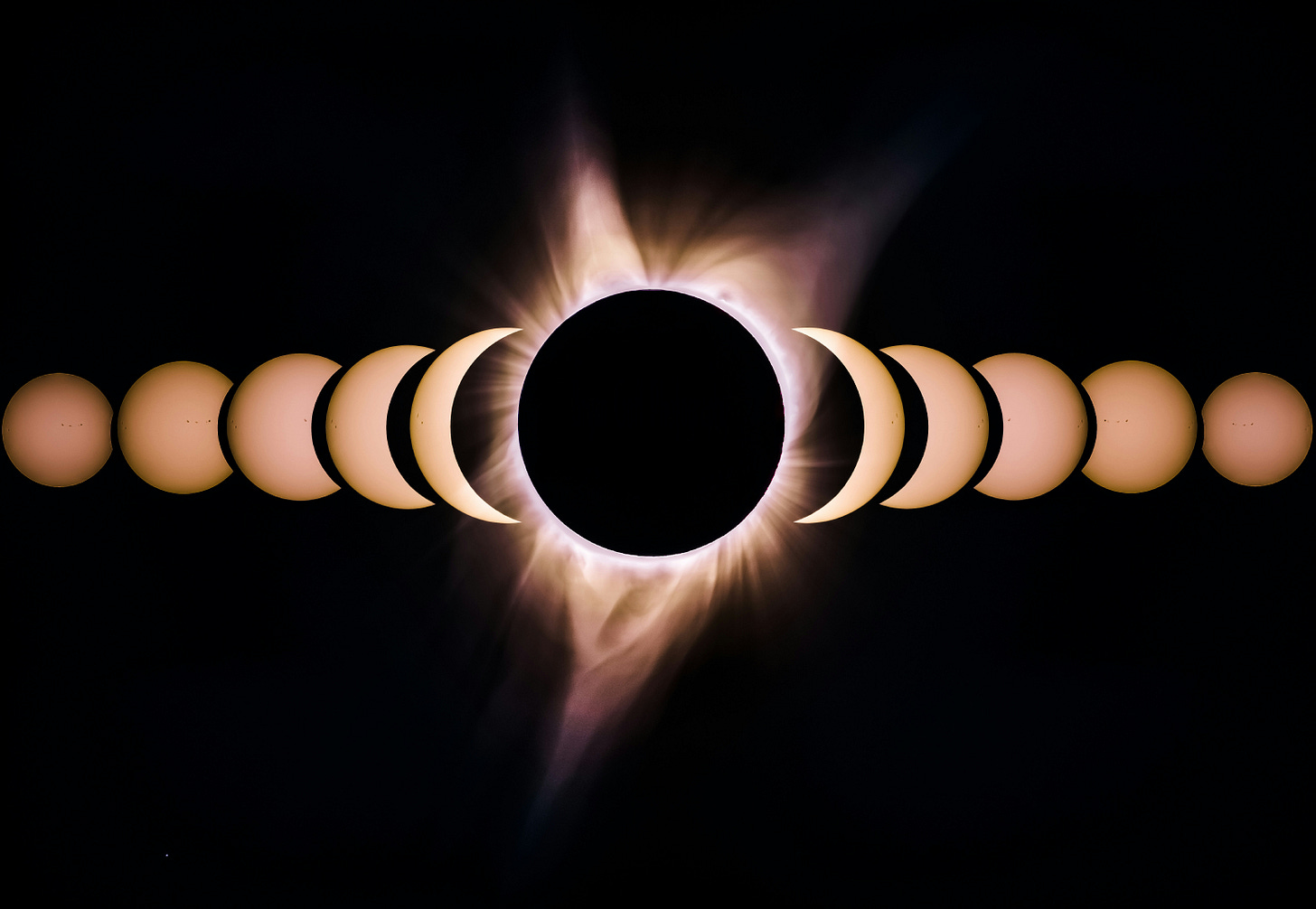To an astronomer, seeing the total eclipse of the sun must feel like the shock and marvel I felt when I trained in surgery and first glimpsed the pulsating insides of the living, human body. After all the lectures, the study, the theory: the first sight of the real thing took my breath away. I thought, we have no idea of what our glistening insides really look like.
There is similar awe when the moon’s shadow moves across the sun, plunging bright daylight into the dark stillness of night. It reminds us: we can’t conceive of our minuscule place in the universe. Immersed in our own sensations, our consciousness, our preoccupations, we’re unable to comprehend the immensity of the space and time around us. Nor can we truly grasp the flip side: our insignificance in the cosmic vastness of the universe.
Photo by Bryan Goff on Unsplash
When we do catch a glimmer of our place in the cosmos—or when we start to grasp the intricacies of our body—it’s same goose bumps we feel.
Of course, we complacently go about our daily lives without thinking about the billions of cells and the intricate chemistry that give us life. In the same way, we hardly notice the black night sky. Even when we do, the starry skies are usually no more than a pretty twinkling for us, a decoration. When we look up, we’re not so different than stone-age people. But with our knowledge we inhabit a different universe.
One of Joseph Conrad’s characters in Chance: A Tale in Two Parts describes
one of those dewy, clear, starry nights, oppressing our spirit, crushing our pride, by the brilliant evidence of the awful loneliness, of the hopeless obscure insignificance of our globe lost in the splendid revelation of a glittering, soulless universe. I hate such skies.
In contrast to that desolation, I stepped outside into the chilly air one wonderfully clear night this February, with my 11-year-old granddaughter and 10-year-old grandson. Above us the constellation of Orion, the hunter, shone brightly. We traced out the stars of his famed 3-star belt and his 3-star sword. Curious about the especially bright star in Orion’s left knee, we looked it up on my Sky Safari phone app. It turned out to be Rigel, a blue supergiant: it has used up most of its hydrogen fuel and is on its way to exploding, as a supernova. Meanwhile it’s emitting 120,000 times more energy than the sun.
Naturally this totally boggled our minds. The three of us gave up trying to imagine it. We retreated to just admiring the giant’s pretty twinkling. With relief.
Terrible omens
Over the ages solar eclipses were seen as horrifying. They were bad omens: signs of coming disaster.
The Bible tells us that a solar eclipse is a portent of calamity. “The hour of doom has come,” God says in the Book of Amos. “I will darken the earth on a sunny day.” Some Talmudic texts interpret eclipses as punishment for sins.
The fear caused by an eclipse even stopped a war.
The Medes and the Lydians ended their six-year war in Anatolia when, according to Herodotus, the ancient Greek historian, the battle was interrupted by “day turning into night”. The terrified kings quickly stopped the fighting. They knew what was good for them. They signed a peace treaty, pronto.
Then along came the Greek philosopher Thales, who in 586 BC correctly predicted when an eclipse would occur.
Portrait of Thales by Wilhelm Meyer, based on a bust from the 4th century
The rationalism of Thales replaced superstition. He is credited by Bertrand Russell as being the first to explaining the natural world through mathematics, science, and deductive reasoning.
And how that science has evolved! An astronomer eloquently expressed his passion for his science.
Doomed, and saved
We all know that life on earth is doomed when the sun implodes, as it will. All our achievements, our work, our legacy, will inevitably end—everything. And not only is our planet a mere minute speck in the universe, the appearance of mankind on it is, in the scheme of things, for a very short time. Yet we proclaim (defensively, loudly) that we are not insignificant. In our philosophies, religions, in our daily lives, we insist on the meaning of life.
Maybe our significance is in being curious; wanting to explore, discover. Discovery is Thales replacing ancient terrors; fear and superstition eclipsed (pun intended) by science. Being driven to see the world anew.
When we look up at the sky with naked eyes, or gaze through telescopes, there is awe; when we peer inside our bodies, and ever closer through microscopes, we feel astonishment. There is purpose in marveling before nature, both the known and the mysteries. In the words of a Jewish Sabbath prayer, not to walk sightless among miracles.
Maybe what saves us from being trifles in the cosmos is our goose bumps.
To see other posts on Peter’s Substack: Musings on Medicine and More, click here.






Excellent piece, reminiscent of our insignificance as stated by Shakespear.
“As flies to wanton boys are we to the gods.
They kill us for their sport.”
― William Shakespeare, King Lear
'Hamlet,' 1:5
"There are more things in heaven and earth, Horatio, than are dreamt of in your philosophy."
A lovely thoughtful piece Peter